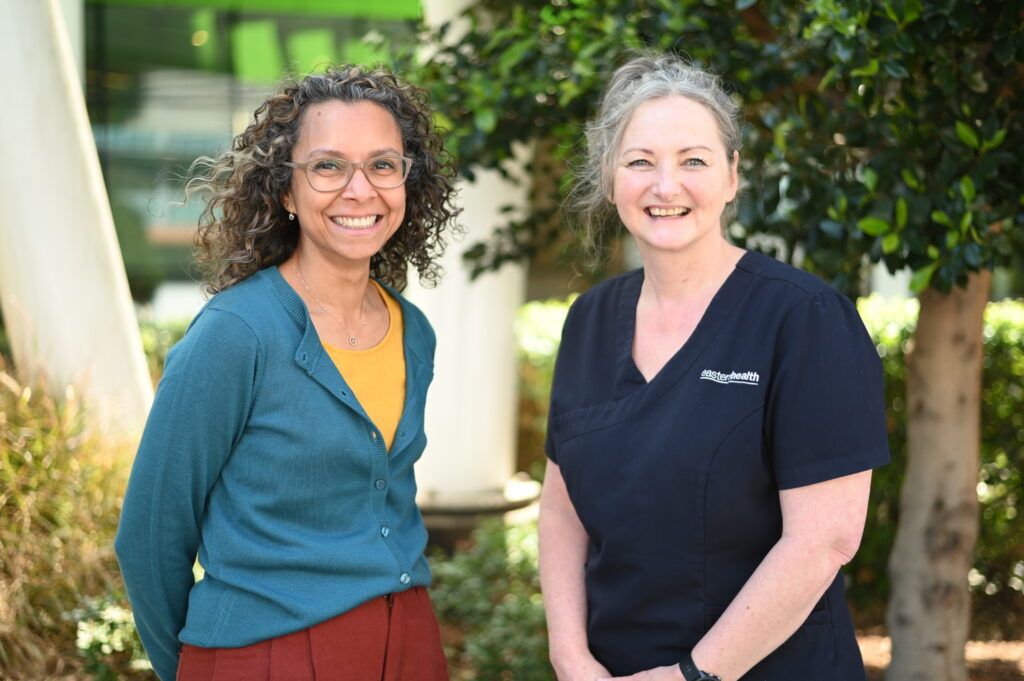Wednesday March 20, 2024
When is the right time to talk about death? The experts at Eastern Health say that this can be one of the most empowering conversations for a loved one to have.
Research Fellow, Dr Lahiru Russell and Advance Care Planning Lead Sam Brean are big advocates for talking about death and dying openly. Through their work they hope to break down the social taboos when it comes to using the words ‘death’ and ‘dying’, in order to empower patients to talk about their wishes and preferences for end-of-life care, and to help their support network of people to gain a better understanding of their condition. “The relationship with the concept of death is deeply missing. Discussions about death and dying should be part of life and people should be able to have a casual conversation about dying and using the word ‘death’,” Dr Russell said.
So when should we be thinking about putting together an Advance Care Plan? Ms Brean highlights that advance care planning can be undertaken at any age and ideally commences before a person is unwell. However, some of the main triggers are closely related to major life event or lifestyle changes such as divorce, loss of physical ability and even the death of loved ones.
“When you feel disempowered to talk about a topic that’s frightening or uncomfortable, you can get lost in emotional behaviours. Advance Care Planning and gives you a structure to start the conversation in a way that that is helpful,” Dr Russell said.

“I think of it more as a communication tool. It’s a way to start thinking about what’s important to me. What do I value in my life? What would I want people to know in order to care for me? Who would I want to speak on my behalf, and how would they know what to say? When it comes to actually writing down a plan, that’s a completely separate process. But the communication is what is invaluable because if you can’t start talking about these things, how can you write a plan?
“It gives the patient a voice. Knowing a person’s likes dislikes, their fears, helps us care for them. It’s really important because it may take away an element of uncertainty. Families don’t have to guess anymore. So it can be really helpful. Making medical decisions for another is hard, especially when someone we care about may die,” Ms Brean followed.
There’s no specific time that is a ‘one-size fits all’ for putting an Advance Care Plan in place, however, it can create more positive health outcomes when it needs to be employed.
“It would be a relief for the medical system to know that there’s someone else putting the plan together. There’s so much on the medical professionals to do so much on top of what they are qualified to do.
“I think what would be helpful is to have clear communication about where to refer to, and access any advance care planning documents quickly. When we were doing this study looking at medical records, we noticed we had to do a lot of digging to find information about patients’ preferences for end-of-life care…If we couldn’t find the information, and we spent the five minutes we had, then there’s a fair chance that this is not happening,” Dr Russell concluded.
Dr Russell and Ms Brean, along with a team of health care professionals researched how end-of-life care documentation was recorded in their study Cancer Decedents’ Hospital End-of-Life Care Documentation: A Retrospective Review of Patient Records.
“End-of-life care is defined ‘12 months before death’. It’s quite hard to predict. An Advance Care Plan can include an individual’s beliefs, values and preferences in relation to future care decisions,” Ms Brean explained.
Conducted in a hospital setting, looking through deceased patients’ records, the study found that while Advanced Care Planning documentation was low, evidence of related discussions was present in all patient records, indicating a high frequency of end-of-life care discussions.
Dr Russell notes there are various ways health care professionals, patients and carers broach the topic of end-of-life care together, however it may not be put on paper.
“What we see written doesn’t necessarily reflect what is happening. During conversations with clinicians we found that typically grief support is not documented, but it’s happening in palliative care settings through conversation.
“A lot of external support information is not documented, but it doesn’t mean that patients did not have support. Even if they didn’t have a family member, neighbours can be very supportive, but we don’t tend to record that. So what is needed here is some more clarity and coordination of care,” Dr Russell said.
Upon reflection of their findings, Ms Brean and Dr Russell explain that although this particular study was conducted within a hospital setting, hospitals may not be the most ideal place to have conversations about Advance Care Planning.
“Hospitals may be the only place these conversations happen, but if it’s a medical crisis, or if it’s a new diagnosis, or if it’s something that comes as a shock, that’s really hard. Hospitals are generally stressful places; you might wait around a long time, and then you may not actually hear what is said, because of the environment. So topics about end-of-life care and Advance Care Planning don’t necessarily flow,” Ms Brean said.
“Safe and high-quality health care involves respecting people’s wishes and choices about their health and clinical care during their illness trajectory and at the end of their life.”
For more information about Advanced Care Planning chat to your GP, visit advancecareplanning.org.au or email the Eastern Health advance care planning service at [email protected].
